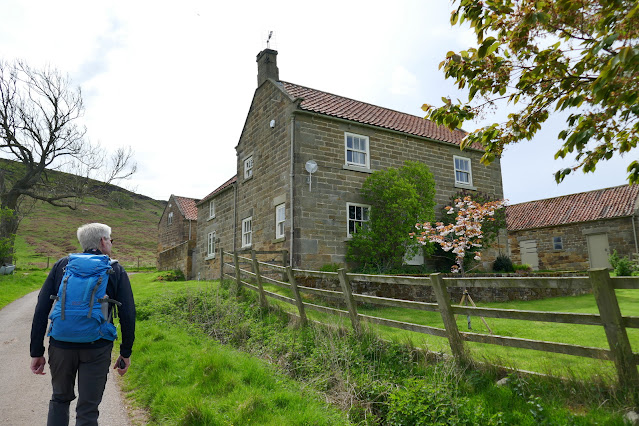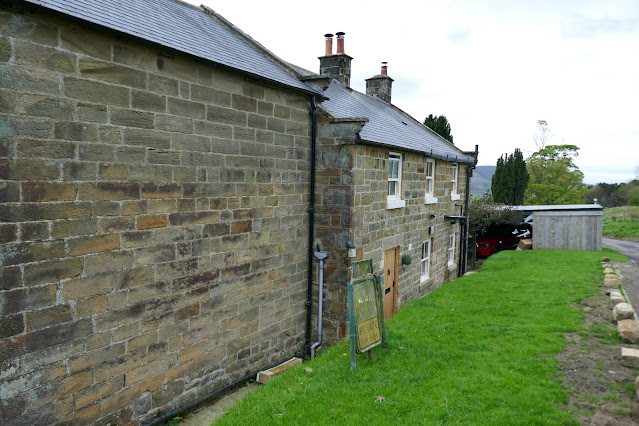Hidden Scugdale
10.9 miles Mostly fine
Although this is not a Tom Scott Burns walk its originator, Harry Whitehouse, in his book called "North Yorkshire Coast and Moors, The Classic Walks" freely admits it was inspired by and developed from one of Tom Scott Burns' walks in The Walker's Guide to the Cleveland Hills. The walk provides a thorough circumnavigation of Scugdale.
 |
| Today's walk from "North Yorkshire Coast and Moors" by Harry Whitehouse |
We parked in Swainby on the road near to The Blacksmith's Arms and walked straight up Swainby High Street until the road splits into Coalmire Road to the right and the dead end Scugdale Road to the left.
We turned left into Scugdale Road and just past the access to Mill Farm we crossed a stile to the right.
 |
| Flowering garlic in Swainby |
 |
| Approaching Scugdale Road |
 |
| Over the stile.. |
 |
| .. and walk towards Mill Farm |
We crossed the field to another stile and passed the farm, pausing to admire their peacocks and guinea fowl. Another stile and field led to the corner of Millfield House. Here we turned sharp right on reaching the buildings and walked across the field to reach another stile in a fence which we crossed before descending some steps to a bridge over Scugdale Beck.
 |
| "They're not all mine!" |
 |
| Peacocks at Mill Farm |
 |
| From Millfield House walk straight over the field... |
 |
| .. to reach a stile and steps down to the beck |
There was a beautiful display of bluebells in Clain Wood and the photographs hardly do justice to them.
 |
| Clive checks that they are the English variety of bluebells - they are! |
 |
| As we get near the beck the bluebells give way to garlic |
After crossing the beck we climbed up to reach the remains of a dismantled railway. In the mid 19th century a railway served Ailesbury Ironstone Mine in Scugdale which was situated at Huthwaite Green. A tramway carried the ore from Huthwaite Green to large calcining kilns and we had heard that the remains of these kilns are still to be seen. We decided to go in search of them and left our route for a while. We turned onto the old railway bed and followed it for some way alongside the beck until we reached the kilns. They were an impressive size but vegetation made it difficult to get nearer for a closer inspection.
 |
| We follow the old track bed |
 |
| We have to cross the beck |
 |
| Interesting but an online search has failed to find a record of this book |
 |
| One of the calcining kilns, the oven bricks to the left |
 |
| The ovens ceased work around 1890 when cheaper imports closed the mine |
 |
| Beech tree roots |
 |
| Millions of bluebells |
We returned to our trail and climbed up to join the Cleveland Way which we followed until it turns towards Huthwaite Green, but here we carried straight on. We now crossed several fields before reaching Harfa Bank Farm.
 |
| Follow the faint track and waymarks |
 |
| Impressive Harfa Bank Farm |
At Harfa Bank Farm we turned left and continued through fields to eventually turn right onto Scugdale Road, leaving it after a few hundred yards to enter the farm track for Holiday House.
Here we stopped to sit in the sun and ejoy our coffee, looking across at Scugdale Hall.
 |
| Lots of wild geese in Scugdale's fields |
 |
| Crow totems near game bird's feeding bins |
 |
| We see climbers on Barker's Ridge opposite |
 |
| Holiday House |
 |
| Scugdale Hall from Holiday House |
 |
| Coffee time |
Leaving Holiday House we descended through fields to cross the beck near to the landlocked bridge and then made the climb to High House.
 |
| Descend through fields |
 |
| ... to reach Scugdale Beck |
 |
| First cross the bridge then cross the beck |
 |
| Climbing to High House |
 |
| High House |
We then followed the broad track from High House to reach the end of Scugdale Road, which we then followed to Scugdale Hall. Just before the buildings we came face to face with several cows and their calves. They seemed unhappy to be so near to us so we moved into the adjacent field to pass them by, thus saving face both for them and ourselves.
 |
| Looking down Scugdale from High House |
 |
| Following the Dale road |
 |
| Confrontation |
 |
| Evasion |
 |
| We return to the road once we're past |
Passing Scugdale Hall we followed the lane down dale to Raikes Farm. Here we leave the lane for a while, cutting across fields before rejoining it and passing Sparrow Hall and Sunny Side House, to reach the Cleveland Way once more. Eventually the Cleveland Way enters woods through a gate to the right but this is where we leave it by a gate to the left.
We followed a fence then reached the permanently muddy entrance to Faceby Plantation. The mud here was deeper than our boots and took a bit of negotiating using branches to cross and eventually by climbing the fence next to the gate.
 |
| The Cleveland Way near Huthwaite Green |
 |
| Turn left through the gate and off the Cleveland Way |
 |
| Heading towards Whorl Hill |
We kept to the left path in Faceby Plantation, eventually leaving through a gate and crossing a field to Bank Lane, where we turned left to walk down to a stile next to a building on the left.
Here we crossed into Whorl Hill and once again were astonished at another fine display of bluebells.
 |
| Bank Lane |
 |
| Leave Bank Lane at the stile |
 |
| Whorl Hill |
 |
| Leaving Whorl Hill |
At the bottom of Whorl Hill we left by a gate at Whorl Hill Farm and followed the signpost to Whorlton, we walked along field boundaries to reach the road.
We passed the old Church of the Holy Cross and Whorlton Castle both of which we have visited and looked round quite recently, and followed the road back to Swainby where we were delighted to find the Black Horse open for business.
 |
| Texel Ram at Whorlton |
 |
| Church of Holy Cross |
 |
| Walkers pass by Whorlton Castle |
 |
| Old gate in Swainby made mainly from traps, note black rats at handle height |
 |
| Yon door is open! |
 |
| To Hidden Scugdale! |
This is quite a long walk but full of interest and highly recommended.












































































No comments:
Post a Comment